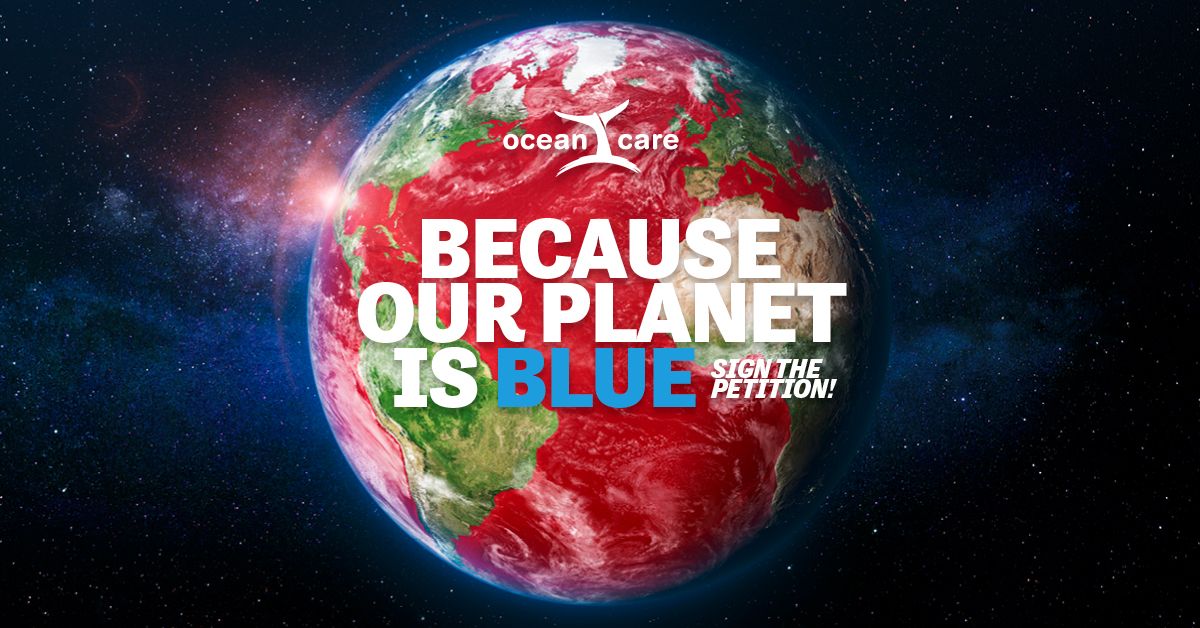Because Our Planet Is Blue

- To António Guterres, Secretary General of the United Nations
- To Emmanuel Macron, President of the French Republic, Co-Host of the United Nations Ocean Conference 2025
- To Rodrigo Chaves Robles, President of the Republic of Costa Rica, Co-Host of the United Nations Ocean Conference 2025
- To all Heads of States and Governments represented at the United Nations Ocean Conference 2025
This petition is run by [% inititator_name %]
Petition
The Ocean is increasingly being threatened, degraded or destroyed by human activities.
To turn the tide, we ask the world’s governments to adopt, at the UN Ocean Conference 2025, six steps – as specified in the OceanCare declaration “Because Our Planet Is Blue” – to be implemented immediately at global, regional and national levels:
1. Ban offshore oil and gas exploration and phase out existing fossil fuel extraction;
2. Implement mandatory measures to reduce vessel speed;
3. Ban destructive fisheries such as bottom trawling;
4. Adopt global rules to end plastic pollution, addressing the full life cycle of plastic;
5. Agree on a global moratorium on deep-sea mining;
6. Ensure effective protection of marine habitats and enforce marine conservation measures to restore ecosystems damaged by human activities.
Why is this important?
The Ocean is the Earth’s cradle of life, nourishing and connecting the entire planet. We all depend on the balance and wellbeing of the endless blue. We all have the duty to take care for it.
Addressing the ocean crisis responsibly means accepting the need to take rapid and far-ranging action to avoid the worst consequences of our unsustainable and unhealthy dependence on fossil fuels and strategic minerals and putting the Ocean on a path to recovery.
Through the Agenda 2030, the United Nations have agreed on seventeen Sustainable Development Goals (SDGs). While many of the SDGs are relevant to ocean conservation, number 14 - 'Life under water' - is at its core. Currently, the world is failing to meet this goal.
As one of the planet's largest carbon sinks, the Ocean absorbs the excess heat and energy released by rising greenhouse gas emissions and trapped in the Earth's system. Today, the Ocean has absorbed about 90 per cent of the heat generated by rising emissions. As the excess heat and energy warms the Ocean, the change in temperature leads to unprecedented cascading effects, including ice melting, sea level rise, and marine heatwaves.
The Paris Agreement's goals can only be met if we immediately stop exploring for new fossil fuel reserves. Yet billions of dollars continue to be spent exploring the seabed for oil and gas, even in marine protected areas. Drilling, production, transport, refining, etc. are often the cause of major oil spills. Hydrocarbon exploration involves the use of airguns, which produce some of the loudest man-made noise ever known.
Anthropogenic noise in the marine environment is generally increasing at an alarming rate. In some areas, underwater noise levels have doubled every decade over the past 60 years. This poses a significant threat to marine ecosystems and the survival of mammals, turtles, fish and other marine life. Shipping is the main source of continuous noise emissions to the marine environment. Ship strikes remain a major cause of mortality for large whales in many regions.
Pollution from the overproduction and consumption of plastics has become an existential threat to the planet, including our ability to stay on track to a 1.5°C world. An estimated 9 million tonnes of plastic waste enters the Ocean each year killing vast numbers of whales, dolphins, seals, sharks, turtles, sea birds, and other marine life.
The use of destructive fishing gear, along with overfishing, is one of the greatest threats to marine ecosystems today. Trawling and dredging should be banned in vulnerable seabed habitats. Harmful fisheries subsidies must be eliminated.
Deep-sea mining could destroy habitats, wipe out populations and species, and cause potentially unavoidable widespread and irreversible damage to ecosystems and biodiversity. It would also interfere with one of the planet's largest carbon sinks in the midst of a global climate emergency.
These threats are likely to cause irreversible damage to marine biodiversity and have lasting impacts on the lives and livelihoods of coastal communities and beyond.
The UN Ocean Conference 2025 provides a unique opportunity for governments to agree on a global strategy to protect and restore the Ocean. It is vital that such a strategy addresses the key gaps in the current failure of world governments to meet the targets of SDG 14. It must also be consistent with the Paris Agreement's goal of limiting global temperature rise to 1.5°C above pre-industrial levels.
The window of opportunity for meaningful action to change this is likely to close within the next 5 to 10 years. We must stop harming our planet and start caring for it. We must protect and restore the Ocean so its inhabitants can survive and thrive. Because our planet is blue.
The time to act is now.
In partnership with:

